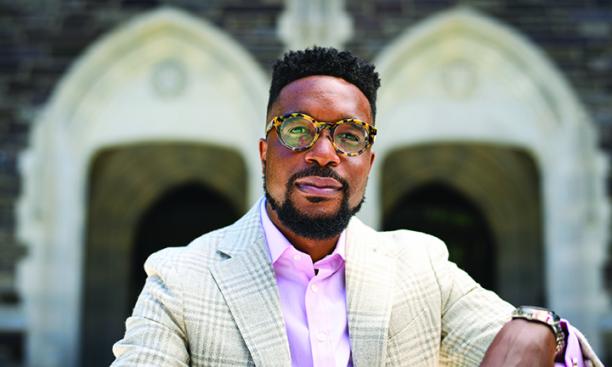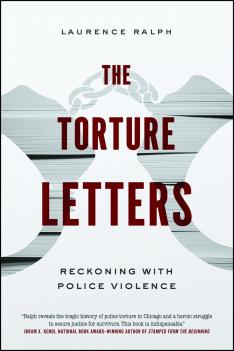
Fifteen years ago, Laurence Ralph began volunteering with local community groups “to get a break from grad school” at the University of Chicago, not as an academic pursuit, he said. Soon, he was drawn into the African American community’s concerns, particularly police violence.
Ralph’s latest book, The Torture Letters: Reckoning with Police Violence (University of Chicago Press), grapples with that legacy of violence. The book begins with a two-decade scandal in which at least 125 African Americans were tortured — beaten, electrocuted, suffocated, and raped — while in Chicago police custody, from 1972 to 1991. The anthropology professor shows how such horrors are connected to and enable the harassment of black people today, through policies like “stop and frisk”; the disproportionate rate at which people of color are killed by police; and seemingly distant practices like the torture of Muslim detainees at Guantanamo Bay.
How did this book come about?
When I was researching my previous book [about gang violence], people kept bringing up police violence. These torture cases came to be the example of why people thought the police department wouldn’t change and the city government wouldn’t do anything about police violence.
How does the use of torture impact society at large?
When we think about violence, it’s not about just the act of violence itself, it’s how violence is tied into secrecy and secrecy is tied into power. We have to look at the whole circuit in order to understand why such an injustice can be maintained for so long.
The use of torture was an open secret for decades in Chicago. When you have cover-ups that last for decades, and police departments that maintain the open secret of torture, you also have communities that don’t believe in the legitimacy of the police, precisely because of torture.
What most surprised you over the course of writing this?
Whenever a scholar embarks on a research project, that project is going to be challenging in different ways that you can’t necessarily anticipate.
But this, studying an open secret, really made me question how I was trained. We’re trained to look at something objectively, to look at all sides of an issue, to value a process of discovery in which we uncover something that’s new. But when you’re looking at a historic injustice, and something that blatantly goes against the tenets of the law and of democracy, then acting as if you can take an objective stance to it sometimes adds to the violence of the issue.
What I mean is that in studying the open secret, one has to also think about how academic knowledge has been complicit in furthering open secrets — in talking about what we can’t know about an issue, or saying that, well, we don’t have the side of the police officer in question, things like this. [The] reason why we sometimes don’t have enough evidence to make the particular arguments we’re used to making is because it’s been systematically blocked from our view. So we have to think about how those silences are forged and created.
Lurking in the background of this study was also an analysis of how knowledge gets obscured, how redactions are purposely put into [government] documents so that you can’t even, as a scholar, hold certain government officials and police officers accountable for what they do, because we don’t know their names. So it’s been a lesson for me in how to study power, which has gone against the ways I’ve been taught in many respects.
The main way is that, as I say in the book, this isn’t an issue I discovered; this is an issue that communities have been grappling with for a long time. It’s just that no one believed them for a long time. So part of my work is to confirm that these things did happen and that they have played a major role in the way that people have thought about policing in the past and the way people think about policing today.
Much of the book focuses on Andrew Wilson, who admitted to killing two police officers and was tortured, rather than one of many innocent people who survived torture. Why?
I’m asking people to commit to the creed that nobody should be tortured, no matter what they’ve done. It sounds simple, and it’s embedded in the legal system in a way, but people make all kinds of exceptions, in practice, when it comes to allowing torture to take place.
In TV and popular culture, we often see the message that if the situation is dire enough, a heroic figure may have to go outside the framework of the law to find the truth, whether by slapping someone around a bit or torturing them.
In the legal system, we have places like Guantanamo Bay where the law is suspended, and what’s called enhanced interrogation methods, which the U.N. considers torture. So in actuality there’s a loophole in the law when it comes to torture. It allows certain people to be tortured. But once we allow that to take place, it corrupts the whole legal system.
The torture scandal you open with happened from 1972 to 1991. How is it still relevant today?
When you think about medical injustice, and the case of the Tuskegee study comes up, people use that as an explanation for why African Americans don’t trust medical expertise. And when you begin to look at the history of it, you see that Tuskegee was just one example of multiple forms of injustice that were not just of the past, but also happen now. So when we think about [the higher rates of] black maternal mortality and things like that, that's part of the same medical establishment that doesn’t treat black pain the same as other forms of pain.
I found a resonance with police violence. [These torture cases were] one example, but there were multiple examples of the same kind of police violence that affected people’s lives up until today. And this was just one way of talking about those examples. So my book moved from being a historical study to how people are living with the history of police violence today.
Interview conducted and condensed by Eveline Chao ’02

